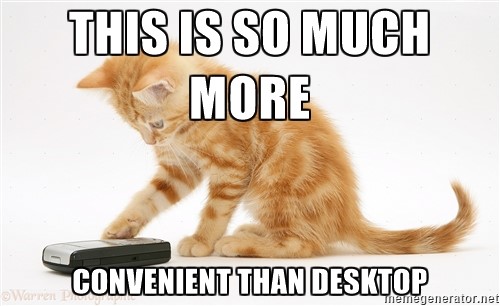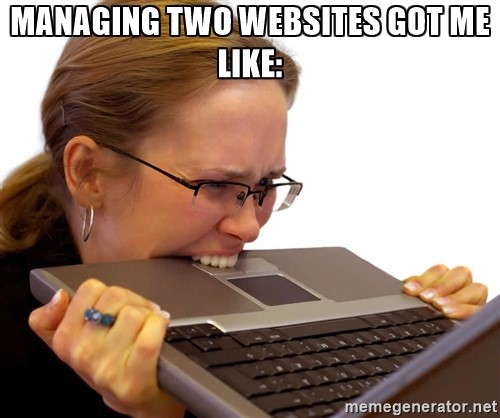
[Disclaimer: the advice and points of view in this post are tailored specifically for the industry that the question comes from. While much of this information can be applicable to your current digital plight, advice will vary from company to company, industry to industry. If you have a question about your market in particular, drop me a line at AskAndy@directom.com]
Hello, you digital darlings, and welcome to the next installment of Ask Andy!
This week we’re going mobile with Florida Virtual School, a fully accredited, online school that is designed for personalized learning.
So, buckle up, and get ready for a wild ride into the mobile world of digital marketing.
Hi, Andy,
I was speaking with some of my staff the other day about some of the things we can do to optimize our website so that we show up higher in search results. Is it important to have a mobile version of our website? People can still access our website from their phone, but how important is it that it’s a mobile version? What would be your number one tip on how to optimize for mobile?
Kris Johnson
Hi, Kris!
I’m glad you asked about this, especially considering the huge impact mobile is having on marketing strategies.
I’ll go ahead and address your first statement before we get into the nitty-gritty details of mobile optimization for your site.
If your site is not optimized for mobile, it will only negatively affect your rankings on mobile search. Desktop and tablet search will not receive any SEO backlash from a site that isn’t optimized for mobile.
Now, having said that, anyone who is not currently optimizing their site for mobile search needs to hop on the bandwagon immediately. Why? According to a study conducted recently by Smart Insights, 80% of internet users own a smartphone. And thanks to that huge number of smartphone users, mobile media time in the US has exceeded desktop, at 51% vs. 42%.
Now that I have gotten those staggering statistics off my chest, let’s jump into your questions.
Mobile Version vs. Responsive Design
While making sure your website is accessible via mobile, it is not necessary to have a mobile version of the site. Quite frankly, managing two separate sites is pretty labor intensive and a gigantic pain in the behind. Aside from the separate-site-management-pain, there are several additional disadvantages:
-
- A mobile site can dilute organic traffic to your site. According to my pal Google, “maintaining a single shared site preserves a canonical URL, avoiding any complicated redirects, and simplifies the sharing of web addresses.”
-
- Link equity will suffer, affecting rankings for the mobile site. See the link above, where ‘Google’ is in blue? Those are your friends. When one site links to your site, it’s basically claiming “Hey! I trust this guy! They have great stuff on their site, you should check them out!” And search engines totally dig trust. Since a mobile site will have a different domain name (ex: flvs.net instead of flvs.net) your link equity will be weakened.
-
- It’s taking on more work than absolutely necessary. Updating two websites, making sure they are reflective of each other, and the content and user experience is cohesive across platforms is exhausting.
I checked out your site on both desktop and mobile, and you guys have done a really wonderful job of implementing responsive design. I also ran your site through Google’s Mobile-Friendly Test, which you passed with flying colors.
In summation: a mobile version of your site is not necessary. Having a separate mobile site will not help you rank higher on mobile search. Responsive design may be a bit more expensive, but renders the same experience, keeps your domain game strong, and cuts down on website management time.
The Elusive Number 1 Tip for Mobile Optimization
Number 1 tips are elusive in the same way unicorns are: they don’t exist… or they are INSANELY good at hiding. For the sake of my next statement, let’s go ahead and assume number 1 tips and unicorns are elusive due to non-existence, not superior stealth skills.
The reason I say this is because there is no one magic way to optimize; if it takes a village to raise a child, it takes a ton of variables to be successful on mobile. However, I am happy to share what I think the top factors are for mobile optimization, in general.
-
-
- A Good Host Goes a Long Way: Make sure you have a quality hosting provider. A slow-loading mobile website is judged most harshly by users and Google alike; in fact, 51% of online shoppers say a slow load is the reason the conversion doesn’t happen.
- Not All Devices Are Created Equal: Have a lead generation form on your site? If so, make sure that you take into consideration that users on desktop are more likely to fill out a long form than users on mobile. Customizing the forms can increase mobile prospects. HubSpot successfully did this, you can read about it here.
- Make Sure Your Content Is Optimized for Mobile Queries: Mobile users will search for things on the fly, as they see them (because, why not?). We’ve all Googled something completely random based on what’s happening in the world around us. Optimize your content to capture these ‘micro-moments’. Easiest way to do so? Make sure your content on your site provides an answer to a problem that one of your buyer personas would have. 91% of people look up information on their smartphones while in the middle of a task. Why? Because they need help. Phrase your content to be helpful (this can also increase your chances of appearing in a Google Knowledge Box).
- A Good Host Goes a Long Way: Make sure you have a quality hosting provider. A slow-loading mobile website is judged most harshly by users and Google alike; in fact, 51% of online shoppers say a slow load is the reason the conversion doesn’t happen.
-
Follow up thought… if you want to read more about micro moments, we’ve got you covered with either of these three posts!
- What Are Micro-Moments To Google (And How Should B2Bs Leverage Them?)
- Cashing In On Micro-Moments
- Cashing in on Micro-Moments Part 2: Google Shopping Becomes Mobile Friendly
It May Be The End, But That Doesn’t Mean It’s Over…
Kris, I hope that these suggestions provided some insight and inspiration. If they didn’t, please let me know and I am happy to elaborate further (talking shop is one of my favorite things).
That’s all for today kids. If you have a digital marketing itch that you can’t quite scratch, shoot me an email at AskAndy@directom.com, and I’ll see you again next week!







